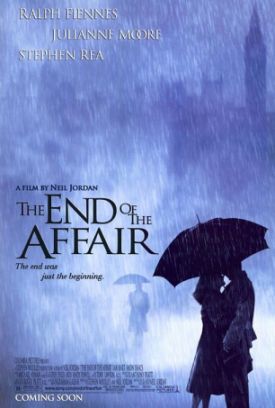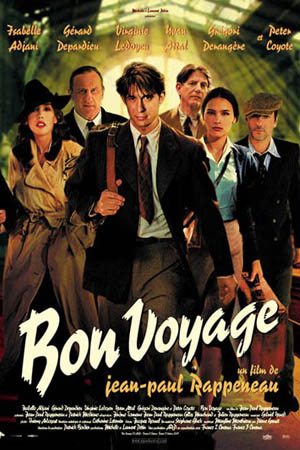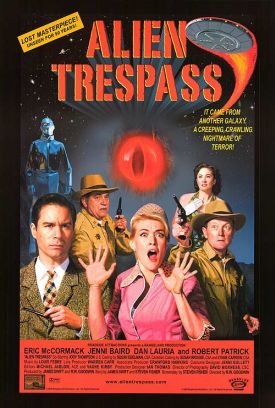End of the Affair, The
There is a scene in Neil Jordan’s adaptation of Graham Greene’s The End of the Affair in which the hero, a novelist called Maurice Bendrix (Ralph Fiennes), and his married lover, Sarah Miles (Julianne Moore), go to a movie based on one of one of Bendrix’s novels. As they sit in the smoke-filled fleapit, we see Bendrix leaning over to his companion and whispering, “It’s not what I wrote.”
She replies: “You can’t keep saying that.”
That’s Neil Jordan’s little postmodern joke—which doubles, presumably, as a message to the critics. But Jordan appears not to understand that the objection to his movie is not that it is not what Graham Greene wrote but that it is false in certain fundamental ways to what Greene intended and what actually produces the emotional heat and light of the novel. But under the circumstances, we should be grateful that this movie isn’t any worse than it is. In fact, enough of Greene’s story survives undimmed, in spite of all that Jordan can do to dim it, that the film is just about worth seeing.
Jordan’s mistakes begin with the casting. Both Mr Fiennes and Miss Moore are far too pretty to look right amidst the bleakness of wartime Britain, and they spend an improbable amount of time with their clothes off. Nor can any number of chalk-striped wool suits make Stephen Rea in the role of Henry, the cuckolded husband, look or talk like a British civil servant circa 1945. In general, the costumes by Sandy Powell, who won an Oscar for Shakespeare in Love, the production design by Anthony Pratt and the photography by Roger Pratt all work together to produce an excellent period feel to the film. The cars, the clothes, the furnishings, even a lot of the clipped and laconic dialogue, are carefully recreated, and only the people look out of place.
Most egregiously, Jordan blithely kicks away one of the pillars on which Greene’s narrative rested, namely the old-fashioned code of the gentleman as to what you do and do not talk about with another gentleman whose wife you are sleeping with. In both the novel and the movie, Henry knows that Bendrix has been and possibly still is his wife’s lover; in both they become friends anyway. But in the film, they talk about this odd state of affairs while in the novel they do not. This may seem like a trivial or unimportant difference, but its consequences are huge. At once the illusion of war-time London, so carefully and admirably built up in every other way, is shattered completely and irrevocably, a victim of the everlasting chatter begotten of the therapeutic culture of our own time.
Jordan either does not see or chooses to ignore the fact that the Bendrix-Henry friendship absolutely depends on their manly reticence about what they both know but cannot talk about while Sarah is alive. Once they open their mouths about it, their friendship ceases to be one manifestation of the mute defiance of human response to the hammerblows of fate—or God—and takes on a decidedly contemporary and kinky cast. Does, we wonder, Henry “get off” on the idea of the affair between his wife and Bendrix? Neil Jordan seems to think so, as he brings forward the moment at which Bendrix moves in with Henry so that the two of them can take turns nursing her during an illness whose dragging out is part of the same process. Sarah in the novel is felled almost by a thunderbolt, like the V-1 that nearly kills Bendrix, and this keeps in the forefront of our attention Greene’s use of chance and accident to represent the apparent arbitrariness of God.
Yet it must be said that Jordan’s film does win points for its surprising respectfulness towards religion. True, very little survives of Greene’s fatalistic sense of being hunted down by a God he almost equally loved and hated. Bendrix says (mostly in voiceover) Greene’s words, but they don’t carry much conviction. It is also a mistake, I think, to omit the rationalist preacher, leaving Bendrix alone to make the anti-God case. But Sarah’s conversion is treated not as we would expect from Hollywood, as a species of lunacy, but with some delicacy and even sympathy. Even here, however, Jordan stumbles. He makes her go back on her promise to God to give Bendrix up, in fact to run off with him for a dirty weekend in Brighton—a detail of utterly un-Greenean tawdriness (as opposed to the many tawdrinesses that are very Greenean indeed).
But to make Sarah relapse is to treat a sacred vow with a jarring and, I suspect, a contemporary insouciance which suggests the lack of seriousness with which the film approaches religion, even when it tries to be respectful. Jordan is able to grasp and to reproduce the piquancy of Sarah’s being unfaithful to her adulterous lover not with another man but with, of all things, faith. But he doesn’t seem to have any real religious feelings of his own and so cannot make us feel the power of Bendrix’s defiance: “I hate you, God. I hate you as though you existed.” It takes a lot of existential energy to produce this paradox, and Jordan hasn’t got it. Even as delivered by the excellent Mr. Fiennes, such a line looks out of place here. It is, however, just about enough to remind us of the momentousness of the question of faith for Graham Greene and for those who read him in the almost unimaginable past of only half a century ago.
Discover more from James Bowman
Subscribe to get the latest posts to your email.








